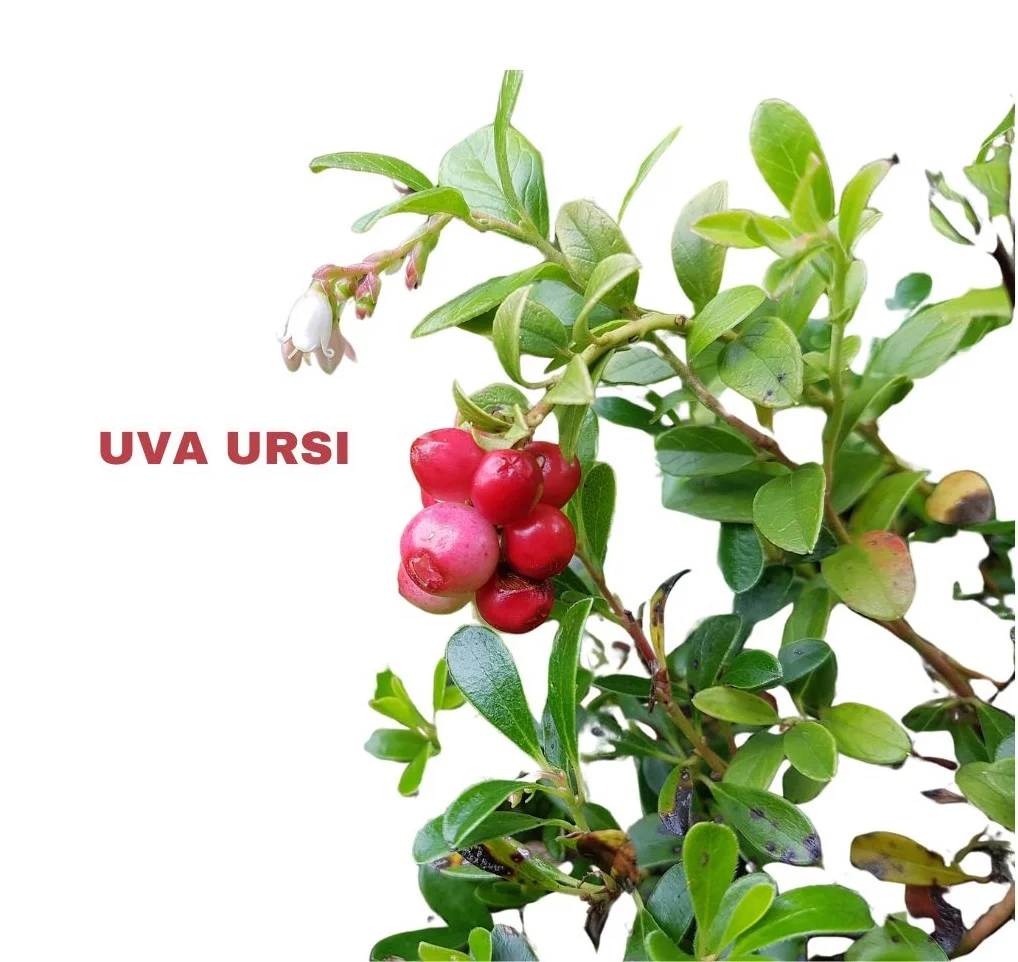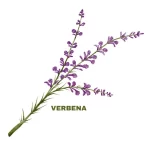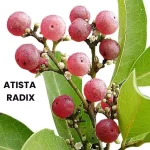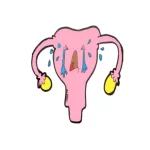Uva Ursi, commonly known as Bearberry, is a medicinal herb renowned for its efficacy in addressing urinary symptoms, particularly cystitis and chronic vesical irritation.
It has a long history of use in traditional medicine for its diuretic and antiseptic properties, making it valuable in treating various urinary tract disorders.

Table of Contents
ToggleSOURCE INFORMATION
Scientific Classification
- Kingdom: Plantae
- Phylum: Angiosperms
- Class: Eudicots
- Order: Ericales
- Family: Ericaceae
- Genus: Arctostaphylos
- Species: Arctostaphylos uva-ursi
Origin
- Uva Ursi is native to Europe, Asia, and North America, where it thrives in acidic soils of mountainous regions.
- It has been a staple in traditional medicine among indigenous cultures in these regions for centuries.
Historical Facts
- Indigenous peoples, including Native Americans and indigenous Europeans, have long used Uva Ursi for its medicinal properties.
- It was commonly employed for urinary issues, cystitis, and uterine hemorrhages.
- The name “Bearberry” is derived from the fact that bears are fond of the fruit of this plant.
- Uva Ursi has been included in various pharmacopeia and herbal traditions throughout history, highlighting its significance in herbal medicine.
DRUG PATHOGENESIS
- Uva Ursi primarily acts on the urinary system, particularly in cases of cystitis, chronic vesical irritation, and pyelitis.
- It is known for its ability to alleviate symptoms such as frequent urging to urinate, burning and tearing pain, and the presence of blood, pus, and mucus in the urine.
- Additionally, Uva Ursi exhibits diuretic properties, promoting urine flow and helping to flush out toxins from the urinary tract.
KEY CHARACTERISTICS
- Affinity for urinary symptoms, especially cystitis and chronic vesical irritation.
- Presence of blood, pus, and mucus in the urine.
- Frequent urging to urinate with severe spasms of the bladder.
- Burning and tearing pain after the discharge of slimy urine.
- Diuretic action aiding in the elimination of toxins from the urinary tract.
Urinary Symptoms
- Frequent urging to urinate with severe bladder spasms.
- Presence of blood, pus, and much tenacious mucus in the urine, often with clots.
- Involuntary urination and green-coloured urine.
- Painful dysuria with burning and tearing pain.
RELATIONSHIP WITH OTHER DRUGS
Compare with,
ARBUTIN
- Arbutin is a crystallized glucoside found in plants such as Uva, Kalmia, and Gaultheria.
- It is administered in doses of 3 to 8 grains with sugar three times a day.
- Used as a urinary antiseptic and diuretic.
ARCTOSPHYLOS MANZANITA
- Acts on renal and reproductive organs.
- Indicated for conditions like gonorrhoea, vesical catarrh, diabetes, and menorrhagia.
- Administered in the form of a tincture of leaves.
VACCINUM MYRTILLUS (HUCKLEBERRIES)
- Used in cases of dysentery and typhoid.
- Keeps intestines aseptic and prevents absorption and reinfection.
DOSE
- Tincture: Five to thirty drops as directed.
- In cases of pyelitis, a trituration of the leaves may be used.
Frequently Asked Questions
What are the primary uses of Uva Ursi?
- Uva Ursi is primarily used for urinary symptoms, particularly in cases of cystitis, chronic vesical irritation, and pyelitis.
How does Uva Ursi affect the urinary system?
- Uva Ursi acts as a diuretic and urinary antiseptic, promoting urine flow and alleviating symptoms such as frequent urging to urinate, burning pain, and the presence of blood and mucus in the urine.
Are there any known interactions with other medications?
- Uva Ursi may interact with certain medications, especially those that affect kidney function or urinary tract health.
- It is advisable to consult a healthcare professional before using Uva Ursi in combination with other drugs.
Meaning of Difficult Words
- Cystitis: Inflammation of the bladder.
- Tenesmus: Painful and ineffective straining to empty the bowels or bladder.
- Pyelitis: Inflammation of the renal pelvis.
- Diuretic: A substance that promotes the production of urine.
- Antiseptic: A substance that prevents the growth of microorganisms.













Leave a Reply